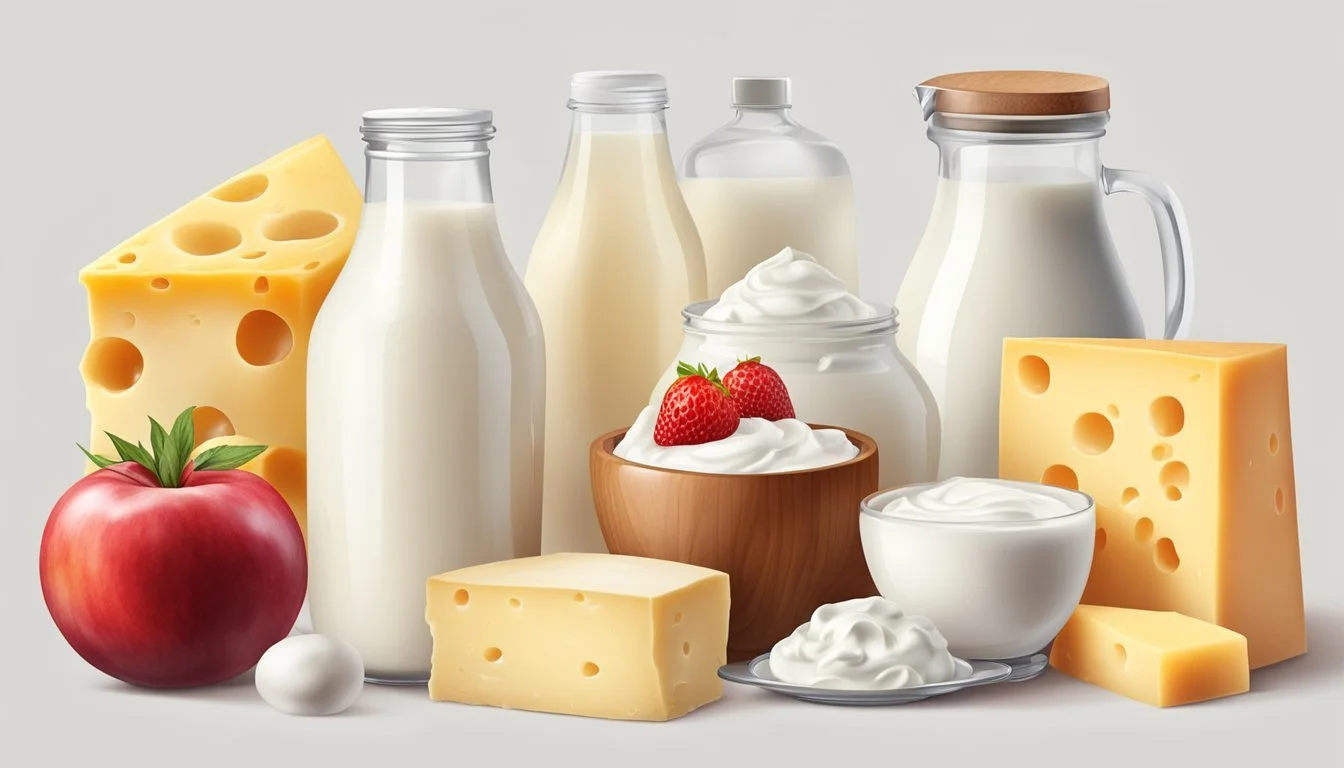Do Dairy Products Cause Inflammation?
Unveiling the Facts
The relationship between dairy products and inflammation is a topic of significant interest and debate within the nutrition and health communities. At the heart of the discussion is inflammation, a natural process by which the body responds to injury and infection, becoming problematic only when it becomes chronic. Some research suggests that dairy products may exacerbate this chronic inflammation, especially in individuals with specific sensitivities or allergies. Dairy items have been under scrutiny due to their content of saturated fats, which some studies associate with inflammatory responses that could potentially aggravate conditions like acne, bloating, and stomach discomfort.
Conversely, other scientific inquiries present a different perspective, indicating that dairy may actually have anti-inflammatory effects in some people. Factors such as the type of dairy product and the individual's overall health and dietary context come into play. For instance, fermented dairy products like yogurt and kefir, which contain probiotics, might even help reduce inflammation. Nutritionists underscore the importance of a personalized approach when considering dairy in the diet, acknowledging that while some may benefit from its inclusion, others might need to limit or avoid it entirely based on their body's responses.
Thus, the question of whether dairy products cause inflammation does not have a one-size-fits-all answer. It's a complex interaction that may differ from person to person, influenced by unique health profiles and dietary habits. Health professionals often recommend monitoring one's own body's reaction to dairy consumption and consulting with a dietitian or physician to determine the most beneficial dietary choices for one's health and wellbeing.
Understanding Inflammation
Inflammation is the body's natural response to protect itself from harm, involving the immune system, various cells, and signaling molecules like cytokines. This process plays a crucial role in healing but can become problematic when it persists longer than necessary.
Acute vs. Chronic Inflammation
Acute inflammation is the initial response of the body to harmful stimuli, characterized by redness, heat, swelling, and pain. This type of inflammation is typically short-term, lasting from a few days to a couple of weeks. It primarily serves as a protective mechanism, where the immune system sends increased amounts of white blood cells, immune cells, and substances like cytokines to the affected area to eliminate the cause of damage and initiate the healing process.
In contrast, chronic inflammation refers to a prolonged inflammatory response that can last for months or years. It often arises when the immune system continues to produce white blood cells and chemical messengers that prolong the inflammatory process, even when the immediate threat to the body has been eliminated. This can lead to a state where inflammation causes damage to the body's own tissues, contributing to the development of various chronic diseases.
Inflammatory Markers and Biomarkers
The presence and intensity of inflammation can be quantified by measuring specific inflammatory markers and biomarkers in the blood. These substances, which include C-reactive protein (CRP), cytokines like tumor necrosis factor-alpha (TNF-α), and interleukins, can signal the level of inflammation within the body. High levels of these markers can indicate an ongoing inflammatory process, which could be either acute or chronic. Health professionals often use these measurements to assess the inflammatory status of a patient and to monitor the progress and treatment of inflammatory diseases.
It's important to understand that while inflammation is a vital part of the body's defense mechanism, it requires careful balance; too little can lead to poor healing, while too much can cause tissue damage and contribute to disease.
Dairy Fundamentals
Dairy products are a prominent part of many diets and contain a variety of nutrients. Understanding the basic components and types of fats and proteins in dairy can help consumers make informed decisions about their consumption.
Composition of Dairy Products
Dairy products, which include milk, cheese, and yogurt, are complex substances that contain water, carbohydrates, fats, proteins, vitamins, and minerals. The key carbohydrate in dairy is lactose, which imparts the mildly sweet flavor to milk. These nutrients are present in varying amounts depending on the type of dairy product.
Types of Fats in Dairy
The fats in dairy products predominantly consist of saturated and unsaturated fatty acids. The saturated fat content has been a focal point of health discussions. For instance, whole milk contains about 3-4% fat, with a significant portion being saturated fat, which has been traditionally linked to inflammation. However, it also contains unsaturated fats, which are considered beneficial for health.
Whole Milk:
Saturated fat: ~3-4%
Unsaturated fat: ~1%
Cheese and yogurt also contain a mixture of saturated and unsaturated fats, with variations depending on type and preparation.
Protein Content in Dairy
Dairy products are an excellent source of high-quality protein, containing all nine essential amino acids. The protein content in dairy varies by product:
Milk: Approximately 3.4% protein
Cheese: Can range from 10% to 30% protein, depending on the type
Yogurt: Roughly 10% protein for Greek yogurt, less for traditional varieties
These proteins contribute to dairy's role in muscle repair and growth. However, some proteins in dairy, such as casein and whey, can cause sensitivities in certain individuals.
Health Impacts of Dairy Consumption
The health impacts of dairy consumption are multifaceted, encompassing its nutrient-rich profile beneficial for various bodily functions and its potential to influence inflammatory processes, with implications for chronic diseases.
Benefits of Dairy Nutrients
Dairy products are a source of essential nutrients that play critical roles in maintaining health. They provide a high level of calcium, which is vital for bone health, and are often fortified with vitamin D, enhancing calcium absorption and bone strength. Additionally, dairy contains other important nutrients like protein, potassium, and various vitamins which contribute to a well-rounded diet.
Key Nutrients in Dairy:
Calcium – Necessary for bone health
Vitamin D – Facilitates calcium absorption; promotes bone health
Protein – Supports muscle repair and growth
Potassium – Helps maintain normal blood pressure
Risks Associated with Dairy Fats
However, full-fat dairy products, such as whole milk and certain cheeses, contain saturated fats, which have been linked to heart disease when consumed in excess. It is also debated that high intake of dairy fats might contribute to obesity. Furthermore, some studies suggest that saturated fats from dairy could contribute to low-grade inflammation, potentially affecting those at risk of type 2 diabetes or heart disease.
Dairy Fats and Health Risks:
Saturated Fats: Can increase risk of heart disease
Obesity: Potential link with high intake of full-fat dairy products
Low-grade Inflammation: Mixed evidence on the role of dairy fats
Dairy in Balanced Diets
In a balanced diet, moderate consumption of dairy products can be part of a strategy to prevent type 2 diabetes and provide necessary nutrient intake without significantly contributing to obesity or low-grade inflammation. The key is balancing the intake of full-fat dairy products with low-fat options, ensuring that individuals gain the benefits of dairy nutrients without excessive intake of saturated fats.
Strategies for Dairy in Diet:
Balance: Mix of low-fat and full-fat dairy options
Moderation: Conscious consumption to prevent excess caloric intake
Variety: Inclusion of diverse dairy products to obtain different nutrients
Dairy and Inflammatory Responses
Research reveals a complex relationship between dairy consumption and inflammation, influenced by factors like fat content and fermentation processes. Individual responses to dairy may vary considerably, especially among those with allergies or intolerances.
Impact of Saturated Fats on Inflammation
High-fat dairy products contain saturated fats, which have been linked to increased inflammation in some cases. However, it is important to note that the connection between saturated fats and inflammation may not apply uniformly to all dairy products. Clinical trials have shown a weak but significant anti-inflammatory effect in some dairy consumptions, suggesting that the response may vary based on other nutritional components in dairy.
Fermented Dairy as Anti-Inflammatory
Fermented dairy products such as yogurt and kefir often contain probiotics, beneficial bacteria that can have anti-inflammatory effects. Studies indicate that these products may lower biomarkers of inflammation. Fermented foods' contribution to the immune response might be due to alterations in gut bacteria, enhancing the body's natural defenses against inflammatory diseases.
Dairy Products and Allergies
Dairy products can trigger an inflammatory response in individuals with a milk allergy or intolerance to lactose or casein. Symptoms such as bloating, diarrhea, and other gastrointestinal issues may occur. For those with existing allergies, consuming dairy products can exacerbate an immune response, leading to inflammation. It is essential to distinguish between lactose intolerance and milk allergy, as the latter can lead to severe allergic reactions.
Research and Evidence
In pursuit of understanding the impact of dairy products on inflammation, researchers have conducted various studies. These explorations aim to delineate the relationship between dairy intake and inflammation, which is a pivotal process in chronic diseases.
Studies on Dairy and Chronic Diseases
Research indicates that dairy products may have a complex relationship with chronic diseases such as diabetes and heart disease. Some randomized controlled nutritional intervention studies suggest that dairy consumption may not significantly increase the risk of these diseases, and may even offer certain protective effects. Investigations into specific inflammatory markers indicate varying outcomes dependent on the type and quantity of dairy consumed.
Role of Dairy in Managing Inflammation
Dairy products contain immunoregulatory components that might influence inflammation. Within obese adults, a demographic at increased risk for chronic inflammation, some dairy components have been found to reduce inflammation. However, this impact is not uniform across all dairy products or population groups, and more targeted research is needed to ascertain the nuances of how different dairy products affect inflammatory processes.
Controversies in Dairy Research
The research field bears controversies, largely due to inconsistent results across studies. While some assessments ascribe an anti-inflammatory role to dairy, others find neutral or even proinflammatory associations. The complexity arises as diet impacts on health, including the risk of diseases like cancer, are multifaceted with contributions from individual health status, type of dairy consumed, and its context within the whole diet.
Nutritional Strategies Involving Dairy
The relationship between dairy products and inflammation depends on the type of dairy, the individual's health, and the overall diet. Various strategies can be employed to include or replace dairy in a diet aimed at reducing inflammation.
Incorporating Dairy in Anti-Inflammatory Diets
Individuals can include dairy in their anti-inflammatory diets by opting for dairy products that are low in saturated fat and rich in beneficial nutrients. For instance, consuming low-fat dairy options such as skim milk, low-fat yogurt, and reduced-fat cheeses can contribute valuable nutrients like calcium and protein without the higher fat content that could potentially contribute to inflammation. Additionally, fermented dairy products like kefir and certain yogurts, which contain probiotics, may help reduce inflammation due to their impact on gut health.
A balanced diet that also includes fruits, vegetables, nuts, fish, and other omega-3 fatty acid sources complements the potential anti-inflammatory properties of these dairy products. Including antioxidant-rich foods ensures a broad intake of anti-inflammatory nutrients.
Alternatives to Dairy
For those with dairy allergies or intolerances, or who prefer to avoid animal products, there are non-dairy alternatives that can be incorporated into an anti-inflammatory diet:
Soy, almond, or coconut milk: Plant-based milks fortified with calcium and vitamin D.
Nutritional yeast: Provides a cheese-like flavor and is often fortified with B vitamins.
Dairy-free yogurts: Made from almond, soy, or coconut, often containing live active cultures.
These alternatives can still provide a nutritional profile that supports health benefits similar to dairy, without the potential inflammatory effects associated with lactose or dairy protein sensitivities.
Customizing Dairy Intake
Customizing dairy intake involves adjusting the amount and type of dairy to align with individual needs and health goals:
Low-fat versus full-fat: Choosing low-fat dairy as part of a diet to reduce inflammation; reserve full-fat options for those with no inflammatory response to saturated fats.
Portion sizes: Limiting portion sizes of dairy products can help manage caloric and fat intake while still enjoying their taste and nutrients.
Frequency of consumption: Rather than having dairy with every meal, one might opt for moderate consumption throughout the week for balance.
This customized approach allows individuals to enjoy dairy's diverse offerings while minimizing the risk of inflammation and accommodating personal health considerations.
Understanding Dairy Sensitivities
Dairy sensitivities, including lactose intolerance and dairy allergy, can manifest through various symptoms, prompting individuals to consider elimination diets as a strategy to manage discomfort.
Lactose Intolerance and Symptoms
Lactose intolerance occurs when the body lacks sufficient levels of lactase, an enzyme needed to digest lactose, the sugar found in milk and dairy products. Symptoms typically include gas, bloating, diarrhea, and abdominal pain. These may appear from 30 minutes to two hours after consuming dairy and can vary in severity.
Dairy Sensitivity and Elimination Diets
Dairy sensitivity refers to the body's negative response to proteins found in milk, such as casein and whey. Unlike lactose intolerance, it involves the immune system and can lead to symptoms such as skin rashes or congestion. An elimination diet often helps in identifying sensitivities. This involves removing dairy from the diet completely and then gradually reintroducing it while monitoring for reactions.
Managing Symptoms Associated with Dairy
Management of dairy-related symptoms involves either avoidance of dairy products or the use of alternatives, such as lactose-free milk or plant-based substitutes. For some, probiotics may help by introducing beneficial bacteria to aid in digestion. It's imperative to ensure that calcium and vitamin D needs are met with appropriate substitutes when dairy is eliminated. People should consult with healthcare professionals before making significant dietary changes, especially if they suspect a dairy injury or sensitivity.
Broader Lifestyle and Dietary Considerations
In assessing the relationship between dairy products and inflammation, it's imperative to consider the broader context of an individual's lifestyle, including weight management, exercise habits, and overall dietary patterns.
Impact of Obesity and Overweight on Inflammation
Obesity is a health condition that considerably magnifies the risk of chronic inflammation. Excessive weight, especially when associated with an increase in adipose tissue, can elicit inflammatory responses. Diets high in calories, processed foods, and fried foods are often contributors to weight gain, which in turn can exacerbate inflammation.
The Role of Physical Activity and Stress
Regular physical activity is known to have an anti-inflammatory effect. Conversely, a sedentary lifestyle can contribute to chronic inflammation. Additionally, chronic stress can lead to a sustained inflammatory response, undermining the body’s health and potentially influencing the impact of dietary choices on inflammation.
Holistic Approaches to Inflammation
A holistic approach to managing inflammation through lifestyle includes a balanced diet rich in leafy greens, fiber, and other anti-inflammatory foods. It's not just about the absence of potentially inflammatory agents like gluten or the presence of dairy; instead, it's the collective effect of lifestyle habits that can help maintain health and reduce the likelihood of inflammation-related issues. Reducing infection risk through good hygiene practices and a healthy diet also plays a crucial role in controlling inflammation.
Conclusion
Research on dairy products and inflammation presents a complex picture. Dairy's role in health and diet is multifaceted, and its impact on inflammation may vary based on individual health conditions and the type of dairy consumed. Some clinical trials indicate that dairy can have a slight anti-inflammatory effect, while other studies suggest that high-fat dairy products could contribute to low-grade chronic inflammation.
People concerned about inflammation should consider the following:
Dairy Quality: Opt for low-fat or fermented dairy products which may be less inflammatory.
Individual Responses: Dairy tolerance can be highly individual; some may experience inflammatory responses, while others do not.
Overall Diet: A diet’s total composition is crucial. Balance and moderation are key, and the inclusion of dairy should be assessed within the context of an individual’s entire dietary pattern.
Health Conditions: For those with lactose intolerance, dairy allergy, or certain autoimmune diseases, dairy might exacerbate inflammatory responses.
In conclusion, individuals must monitor their own responses to dairy consumption and consider the type of dairy products they consume. Healthcare providers can offer personalized advice, aligning with one’s health objectives and dietary needs. While some may need to limit dairy to manage inflammation, others might tolerate it well as part of a balanced diet.




